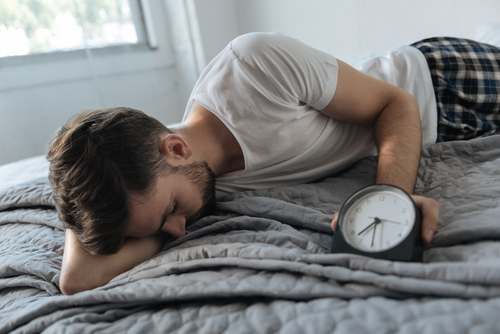Sleep Hygiene for CAD

A good night’s sleep is essential to your physical and mental health, as well as your quality of life. Everyone can benefit from good sleep hygiene including people with cold agglutinin disease (CAD).
About CAD
CAD is a rare autoimmune disorder in which exposure to cold temperatures, from 32 to 50 F (0 to 10 C), causes autoantibodies called cold agglutinins to bind tightly to red blood cells. This binding induces their lysis (disintegration) and results in anemia.
CAD may manifest as a primary or secondary disease. In primary CAD, the underlying cause of the disease is not known. Secondary CAD typically develops due to bacterial, viral, or parasitic infections. Certain types of cancer or other autoimmune diseases, like systemic lupus erythematosus, may also lead to secondary CAD.
CAD and sleep
In a recent study of 16 people living with CAD, 43.8% of those interviewed by researchers reported experiencing sleep disturbances.
The exact cause of how CAD may lead to sleep problems is not clear. One explanation could be that sleep patterns change with age. Many people find that aging causes them to have a harder time falling asleep. Since CAD commonly affects adults of middle age and older, this could explain the high prevalence of sleep disturbances in this group of patients.
Sleeping issues in secondary CAD may be linked to infection. Changes to sleep patterns are often among the earliest responses to infection.
A good night’s sleep can help the body recover or boost energy levels, and help reduce fatigue. This underscores the importance of good sleep hygiene.
Sleep hygiene
Sleep hygiene is defined as behaviors you choose to promote a good night’s sleep so you will be more alert and active during the day.
Good sleep hygiene includes establishing an evening routine and going to bed around the same time each night. It also means sleeping for about the same amount of time every night.
Tips for better sleep
Develop your own rituals to remind your body that it’s time to sleep. Some people find it helpful to do relaxing stretches or breathing exercises for a few minutes before bed each night or sit calmly with a cup of caffeine-free tea.
Leading up to bedtime, doing something relaxing may help, such as taking a warm bath. Perhaps you can do some reading. Resist reading from a phone or computer, however, or watching TV, for several hours before bedtime. So-called “blue light” from those devices inhibits the release of the sleep-promoting hormone melatonin.
Set your bedroom thermostat at a comfortable temperature, making sure it’s not too cool in the room for your condition.
Avoid heavy or spicy foods, and alcohol or stimulants shortly before bedtime.
Other suggestions include limiting daytime naps to 30 minutes, getting adequate exposure to natural light during the day, balancing fluid intake, and having a comfortable mattress and pillows. Sometimes ocean sounds or soothing music can help.
Only try to sleep when you actually feel tired or sleepy, rather than spending too much time awake in bed.
If your sleep still is not improving, you may want to get a referral to a sleep clinic, where specialists will assess you and attempt to find help for your specific sleep problems.
Last updated: Feb. 25, 2021
***
Cold Agglutinin Disease News is strictly a news and information website about the disease. It does not provide medical advice, diagnosis, or treatment. This content is not intended to be a substitute for professional medical advice, diagnosis, or treatment. Always seek the advice of your physician or other qualified health provider with any questions you may have regarding a medical condition. Never disregard professional medical advice or delay in seeking it because of something you have read on this website.





